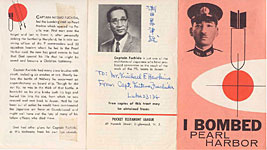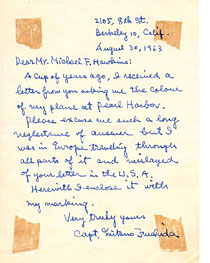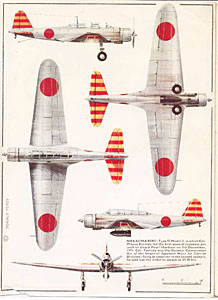|

|

|
|
Captain Mitsuo Fuchida, the officer who led the Japanese air raid on Pearl Harbor, came to Christ in 1950 after contacting The Pocket Testament League. He went on to work for the League to share how God can change lives. This tract was used by the League in the 50's and 60's. Click the image to view a larger version.
|
December 7, 1941 was a tragic day that altered the very fabric of life for America. Though many brave young men lost their lives in the devastating attack on Pearl Harbor, the man who led the raid ultimately gave his life to Christ and went on to save many more lives in the years that followed. Captain Mitsuo Fuchida worked for the League, traveling throughout Japan, America and Europe to share his story of God's grace. Here is the wording from a tract used by the League in the 50's and 60's to demonstrate how God changes lives.
"I am Mitsuo Fuchida. As Chief Commander of the air squadron, I participated in the air raid on Pearl Harbor on December 8, 1941 (Japan time), which opened the Pacific war.
That morning, seating myself in the first plane, I led the whole squadron of 360 planes into Pearl Harbor, and having ascertained that the main force of the American Pacific fleet, comprised of eight warships, was at anchor in Pearl Harbor, I lifted the curtain of warfare by dispatching that cursed order number one, “Whole squadron, plunge into attack!”
My heart was ablaze with joy for my success in getting the whole main force of American Pacific fleet in hand, and I put my whole effort into the war that followed, the result of which was that misery which is clear to everyone today.
Having thus started participation in the war, I devoted myself to conducting warfare throughout the following four years, during which I faced death several times, but was miraculously saved every time to survive and see the war’s termination.
 |
|
A letter from Fuchida to someone asking about his airplane. He often received such requests while touring with the League, providing an opportunity to share his faith. Click the image for a larger version.
|
After the war -- and 25 years of Navy service -- I retired and took myself to farming, but it was indeed a path of thorns to me. I had never in my life realized so keenly the unreliability of other men as I did during these years. I built my house and dug the well; but my life was a reenactment of the story of Robinson Crusoe.
However, as I continued living in closer relation to the earth, my mind was gradually led to think of the presence of God, the creator of all these. I came to feel ashamed of my former godless idea that man’s own power and ability was his only trustworthy resource. I had never been an atheist. But I was brought up in circumstances of very little religious atmosphere, and grew into manhood without any religion. When I enlisted in the Navy, I adopted the “war catechism” as my only ideology.
With the termination of war, the national aspect was altogether transformed and Japan stepped out for the reconstruction of the nation with the slogan of PEACE. In the years that followed, I watched the constant change of social phenomenon, but with cold eyes. Finally I arrived at the conclusion that the only way for the Japanese to survive and prosper would be for the Japanese people to become thoroughly peaceful, irrespective of other nations’ conditions.
|

|
|
The aircraft flown by Fuchida was the Mitsubishi Zero. He enclosed this illustration with his response to the question about his plane. Click the image for a larger version.
|
However, my militarily specialized mind saw in the prevalent world conditions a possible danger of another war and a second Pearl Harbor. Therefore, with the sincere desire to warn the people, I determined to send out into the world a book entitled “No More Pearl Harbor” no matter how insignificant my work might be.
As my writing progressed, I came to realize that in my appeal for “No More Pearl Harbor” there must be an assurance of the transformation of hatred among mankind to true brotherly love. So long as mankind remained in opposition to one another within the frame of nationality, the only consequence could be the destruction of civilization.
The latter half of the twentieth century should be a generation of mankind is a whole, and not a generation of separate nations; but finally the problem remained as to WHO could be the one to accomplish such a great task as this.
In the midst of these thoughts, one day in Tokyo that Shibuya railroad station at a Pocket Testament League meeting, I received a Christian pamphlet. The pamphlet was the testimony of Sergeant Jacob DeShazer entitled, “I was a War Prisoner of Japan.”
At the first glance my mind was captivated and I read the pamphlet through with great enthusiasm. One portion of the pamphlet interested me particularly, and that was the confession of Mr. DeShazer that during his imprisonment, he one day came to feel a strong desire to read the Bible. He recalled what he had heard before about Christianity which could transform human hatred into a true brotherly love. This portion, as I read, drew my mind to the same state, and with a desire to read the Bible I purchased one and started reading. Before covering the first 30 pages my mind was strongly impressed and captivated.
“This is it!” I was strongly convinced. I concluded that the true realization of a “ No More Pearl Harbor” was no other than to expect Christ’s second coming and to endeavor to prepare men from all over the world to welcome Christ’s return.
As a first approach towards this, I was convinced that I should first of all become a good Christian. Thus, I contacted the Pocket Testament League representatives who showed me from the Bible how to become a Christian. I then opened my heart and accepted Jesus Christ as my personal savior on April 14, 1950.
I still realize my need of Christian growth, but I feel great joy in my daily Bible reading, and my heart is filled with peace as I kneel down to pray. Moreover, I think I can say today without hesitation that God’s grace has been set upon me and guided me even before I came to know Christ.
Text of separate page in tract:
Captain Mitsuo Fuchida, led the bombing raid on Pearl Harbor which opened the Pacific war. First man over the target and last to leave it, after personally sinking the battleship Maryland, he was sole surviving officer of the seven commanders and 32 squadron leaders whom he led in the Pearl Harbor raid. He now has good reason to feel that God spare his life that he might be saved and become a Christian testimony.
Captain Fuchida had many close brushes with death, including six crashes at sea. Shortly before the Battle of Midway he underwent an appendectomy on board ship. Though he did not fly, he was in the thick of that battle. A bomb-hit on his ship broke both his legs and hurled him into the sea, from which he was rescued and send back to Japan. Had he not been out of the action, he would have a commanded the Japanese Air Force at Guadalcanal and might have met the fate of many of his fellow officers who died there. God had other plans for Captain Fuchida, as his testimony from his own lips reveals.
Text on back cover of tract:
Captain Fuchida is just one of the multitudes of Japanese who have professed conversion as the result of the work of The Pocket Testament league teams in Japan.
Top of page
|





